In this article:
You may have noticed the appearance of numerous tiny and itchy blisters on your skin after being in intense heat or have experienced excessive sweating for long periods. The development of such a skin rash is called prickly heat, also called heat rash.
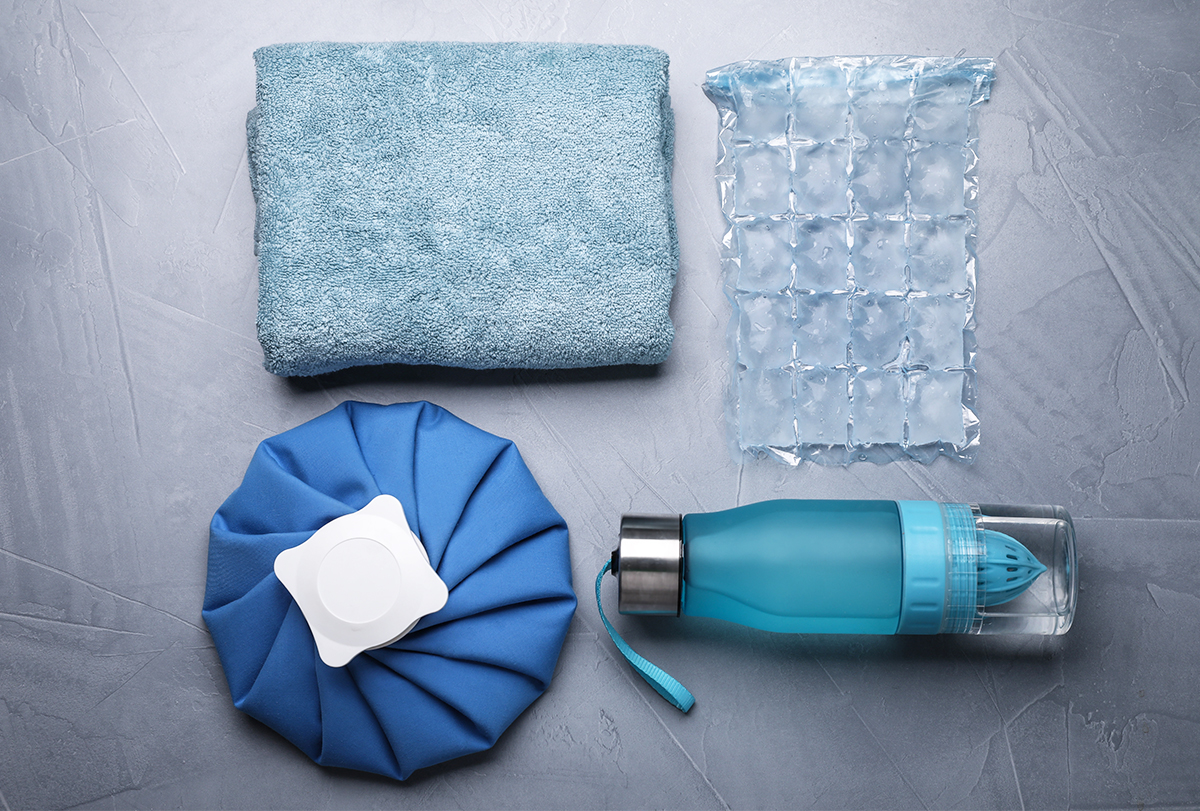
Prickly heat occurs due to the clogging of pores with dead skin cells and bacteria, preventing the sweat from traveling to the body surface and evaporating. (1) It is medically known as miliaria and is characterized by a stinging sensation and red rash on the skin. (2)
Although prickly heat is a mild problem that rarely requires medical attention, it is vital to take good care of your skin to prevent the problem from escalating and spreading to other body parts.
Various home remedies to aid recovery from prickly heat are recommended in this article.
Home Remedies for Prickly Heat
Prickly heat can be easily managed by keeping the skin cool, thus preventing sweating and irritation. The following simple at-home remedies can help treat a heat rash:
1. Apply a cold compress
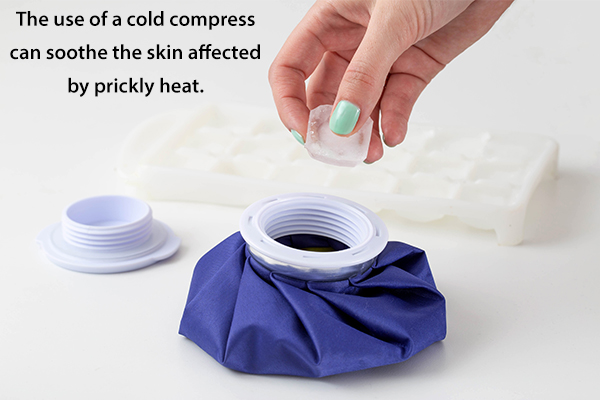
The use of a cold compress can soothe the skin affected by prickly heat.
How to use:
- Dip a clean washcloth in cold water, and wring out the excess water. You can also wrap an ice pack in a towel.
- Apply the cold towel or ice pack to the affected area.
- Remove the ice pack every 5–10 minutes for a couple of minutes to prevent damaging your skin.
2. Use aloe vera gel
Aloe vera gel contains antiseptic and antibacterial properties (3) that can be highly useful in treating prickly heat.
Applying aloe vera gel to the affected area not only improves the redness and inflammation but also provides hydration and nourishment to prevent skin dehydration.
How to use:
- Apply fresh or medicated aloe vera gel to the affected area.
- Wash it off after 15–20 minutes or leave it on overnight. (4)
3. Take an oatmeal bath
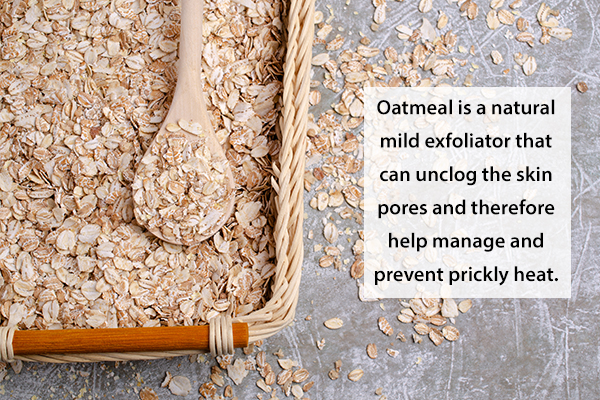
Oatmeal is a natural mild exfoliator that can unclog the skin pores and therefore help manage and prevent prickly heat. Moreover, it soothes the skin, bringing down the inflammation and itching.
How to use:
- Add oatmeal in lukewarm bathwater and allow it to mix for about 20 minutes. Avoid using hot water as it can aggravate the heat rash. (5)
- Soak your body in the oatmeal bath water for 10–15 minutes.
- Take a cold shower.
4. Apply sandalwood paste
Sandalwood acts as a soothing and cooling agent on the skin, therefore helping improve prickly heat and its symptoms.
How to use:
- Mix sandalwood paste with rose water.
- Apply the paste to the affected areas.
- Let the paste dry, and then rinse it off with cold water. (6)
5. Use neem leaves
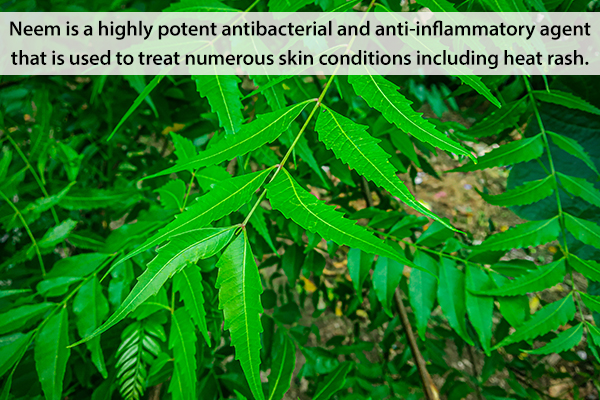
Neem is a highly potent antibacterial and anti-inflammatory agent that is used to treat numerous skin conditions including heat rash.
How to use:
- Make a paste by mixing neem powder and water.
- Apply the paste to the affected area.
- Rinse it off after a few minutes of application. (7)
6. Take an Epsom salt bath
Epsom salt baths can help soothe the skin and relieve inflammation and itching.
How to use:
Add a cup of Epsom salt to your bathwater and soak in it.
Note: Avoid using hot water for the bath. Make sure that you do not ingest the bathwater as Epsom salts can act as laxatives and cause diarrhea. (8)
Lifestyle Measures and Preventive Tips
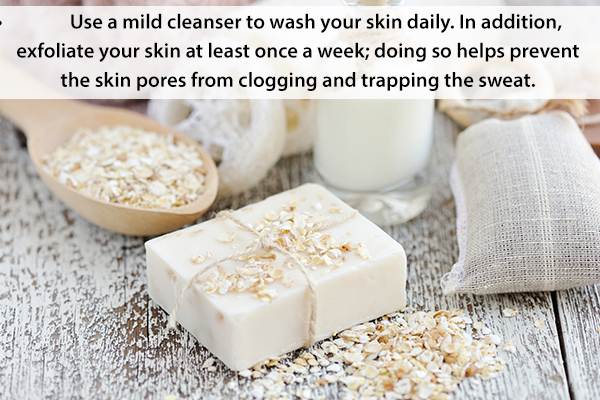
Preventing prickly heat and avoiding its associated discomfort is quite easy when you follow these tips:
- Use a mild cleanser to wash your skin daily. In addition, exfoliate your skin at least once a week; doing so helps prevent the skin pores from clogging and trapping the sweat.
- Limit your physical exercise in hot, humid conditions. (9)
- Maintain optimum body weight to prevent skin folds and therefore friction.
- Wear clothes made of breathable, moisture-wicking fabrics. Use loose clothing instead of body-fitting ones. (10)
- Stay in a cool environment, such as in air-conditioned rooms, if you are prone to developing a prickly rash. (11)
- Consume plenty of water to avoid skin dehydration.
- Avoid scratching or touching your rash. If the itching is intense, tap it instead. (12)
- Refrain from using shower gels or creams containing artificial fragrances as they can cause skin irritation.
Most-Asked Questions About Prickly Heat
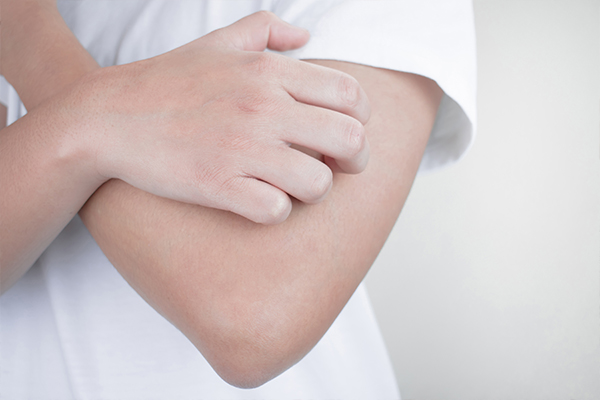
Who can develop prickly heat?
Prickly heat is common in people of all ages and genders. However, it frequently affects newborns, infants, elders, and people who are obese. Additionally, the risk of developing prickly heat increases in tropical climates.
How long does it take for prickly heat to clear?
Prickly heat generally improves on its own within a week, provided that the rashes are not exposed to further heat and the skin is protected from irritants. If the rash persists, consult your doctor.
Final Word
Prickly heat is a common skin problem encountered in hot weather. However, when taken proper care of, it can clear up in a few days. Also, several at-home self-care remedies can help aid in providing relief and hastening recovery.
Additionally, a few lifestyle changes can help prevent a heat rash from developing. These measures include keeping your skin pores clear, avoiding excessive heat, and limiting sweat-causing activities. If the rash persists despite proper care, consult your doctor.

- Was this article helpful?
- YES, THANKS!NOT REALLY


